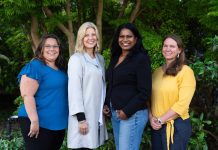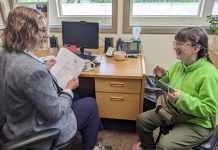While a dentist’s office might not top the list of a child’s favorite destinations, it’s comforting to know there are dentists that specialize in making the experience as pleasant as possible. And some dentists go even a step further—seeking out further education on kids with special healthcare needs and how best to serve them. As Autism Awareness Month came to an end in April, I sat down with Dr. Sawyer of Bellingham Pediatric Dentistry who wants parents with kids on the autism spectrum to know that he’s here, and he’s ready to help.

“Not all dentists are trained to treat children with autism, but it’s one of the subsets of my clinic that we really excel at,” says Dr. Sawyer. “As a pediatric dentist, part of my training for my residency after dental school was focusing on children with special health care needs, and that includes children with autism.”
The CDC estimates that roughly 730,000 Americans under the age of 21 are on the spectrum, including one in every 110 kids under the age of eight. That reflects an increase of 57% from 2002, so there’s certainly a need for professionals who have trained to serve this community.
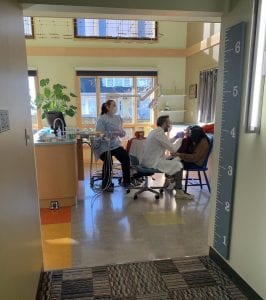
Dr. Sawyer took part in a University of Washington Pediatric Dentistry residency in Seattle, where faculty member Travis Nelson held an autism clinic.
“One day a week he would just see children with autism, and he would work on desensitizing them to the dental environment,” says Dr. Sawyer. “Desensitization doesn’t have a negative connotation; it’s a really powerful technique we use for a lot of children.”
Dr. Sawyer keeps in mind that whether or not they are living with autism, every single child is different, and there are different places in which they can find difficulties in their lives, such as social interactions, communication, repetitive behaviors or restrictive interests, also known as hyperfocus.
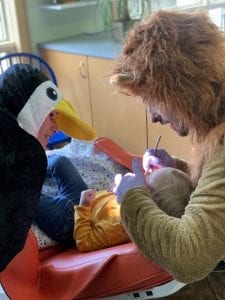
“One thing I do in my office is try to help the parents and the children master the dental experience,” Dr. Sawyer says. “I remember my first visit with one five year old with autism was in my parking lot, in the back of his minivan, because that’s as far as he wanted to go.”
From there, it’s a matter of seeing how far and how quickly the child might be comfortable moving. “We started seeing him more often, for what we call ‘happy visits,’” says Dr. Sawyer. “Basically, getting out of the car, getting into the waiting area, getting into the office, getting into the chair, letting me look in his mouth with a mirror so that he could get used to it.”
He has another method that he calls “Tell Show Do.”
“I tell them what I’m going to do, I show them what I’m going to do, and then I can do it. Laying that out for the kids and having them expect everything really helps them get used to the dental environment,” Dr. Sawyer says. “Sometimes I show them the tools I’m going to use, or I show them the chair, how it goes down or up. Sometimes I have a model or they have a doll with them, and we’ll kind of pantomime on that, and I’ll have the child help me.”
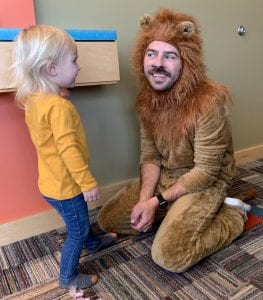
Some of his most important outreach involves teaching parents, and having them bring their kids in early, even earlier than some new parents expect.
“We always say to get kids in at the first tooth, or first birthday,” says Dr. Sawyer. “Within most of my early visits, I focus on parent education. Parents have a lot of questions when they come in, and whether their kids are on the spectrum or not, they all kind of come from that same background of ‘What do I do?’”
With patience and understanding, Dr. Sawyer is committed to making both parents and patients comfortable when they visit him in his office—helping prepare them for a lifetime of healthy habits.

All photos courtesy Bellingham Pediatric Dentistry
Sponsored
























